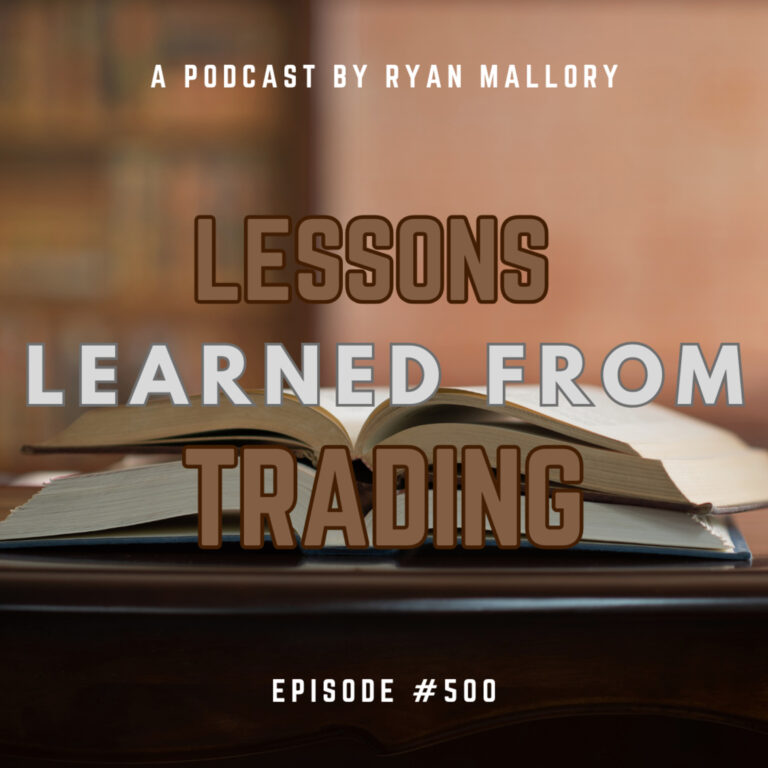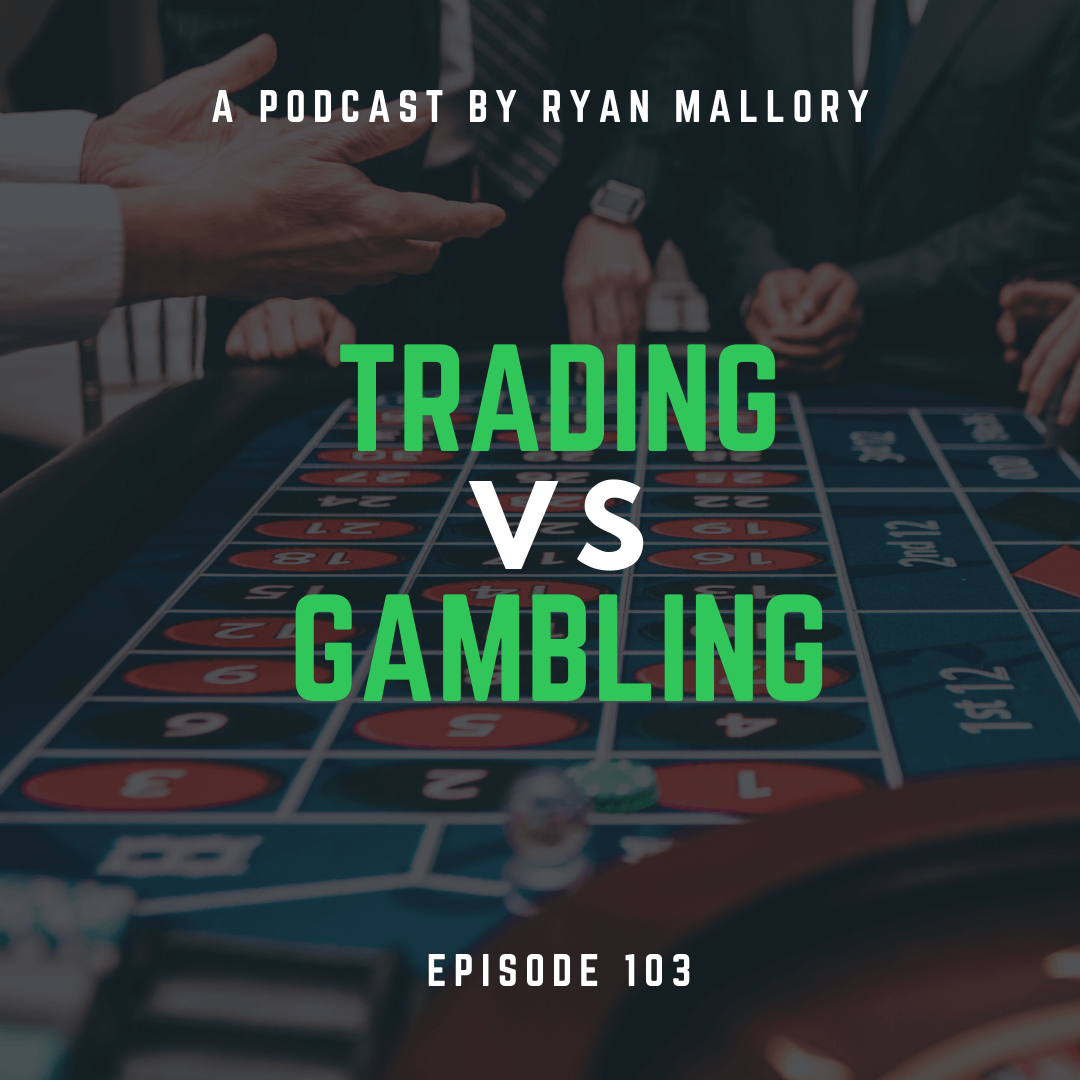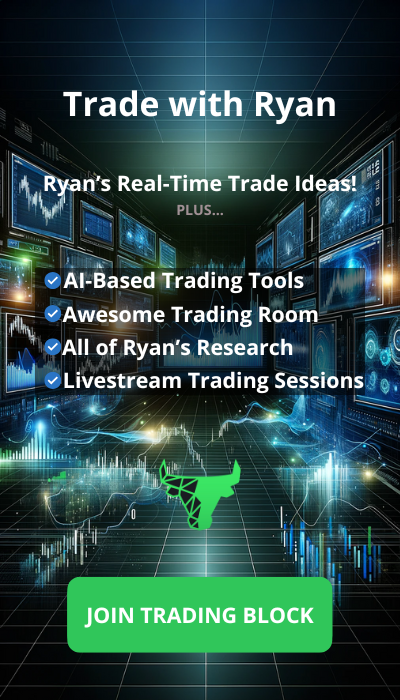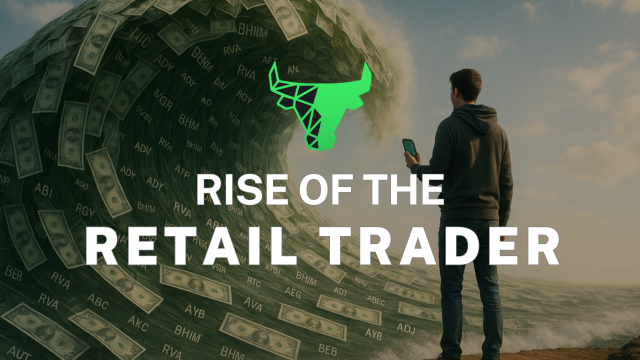Episode Overview
There is an influx of new traders in the stock market since the Covid-19 lows were struck. But instead of trading, it is more like gambling on the Las Vegas Strip. Hoping to strike it big, the lose it all, all under the guise of believing what they are doing is investing. No exit plan, and no understanding for where to get out at, most will lose everything they put into the stock market to trade. Hear in this episode how to trade rather than gamble.
Available on: Apple Podcasts | Spotify | Amazon | YouTube
Episode Highlights & Timestamps
- [0:07] Trading vs Gambling Mindset
Ryan opens with a story from a 22-year-old listener who recently received a $20,000 settlement and went all-in on airline stocks. He begins breaking down the flawed thinking behind confusing gambling with trading. - [2:42] When a Hot Streak Turns into a Mistake
The listener made $5,000 to $7,000 in profits in just 72 hours but lost it all by holding too long. Ryan explores why making money doesn’t always mean it was a good trade. - [4:30] The Psychology of “Free Money”
Ryan explains why people tend to take bigger risks when the money they’re investing wasn’t earned through hard work, and how this leads to reckless trading behavior. - [10:42] Selling Is a Skill, Not a Weakness
Ryan emphasizes the importance of scaling out of positions and using stop-losses. He provides a personal example from trading SLV to highlight disciplined exits. - [14:35] You’re Not Above Risk
Ryan concludes that even if you believe an industry like airlines is “the opportunity of a lifetime,” it still demands a plan, a stop, and risk management.
Key Takeaways from This Episode:
- Gambling vs Trading: Going all-in on a single industry without risk controls is not trading; it is gambling.
- Respect the Source of Your Capital: Money you didn’t earn is easier to risk carelessly, so extra caution is needed.
- Manage Risk, Not Just Profit: Big gains are meaningless if you don’t lock in profits or use stops to protect your capital.
- Emotions Cloud Judgment: Thinking “this time it’s different” or “it can’t go lower” are signs of emotional, not rational, trading.
- Opportunities Still Require Discipline: Even in the most promising setups, you need a plan and exit strategy to survive and thrive.
Resources & Links Mentioned:
- Swing Trading the Stock Market – Daily market analysis, trade setups, and insights by Ryan Mallory.
- Join the SharePlanner Trading Block – Get real-time trade alerts and community support.

Take the Next Step:
✅ Stay Connected: Subscribe to Ryan’s newsletter to get free access to Ryan’s Swing Trading Resource Library, along with receiving actionable swing trading strategies and risk management tips delivered straight to your inbox.
📈 Level Up Your Trading: Ready for structured training? Enroll in Ryan’s Swing Trading Mastery Course, The Self-Made Trader, and get the complete trading course, from the foundational elements of trading to advanced setups and profitable strategies.
📲 Join the Trading Community: Sign up for SharePlanner’s Trading Block to become part of Ryan’s swing-trading community, which includes all of Ryan’s real-time swing trades and live market analysis.
Full Episode Transcript
Click here to read the full transcript
0:07
Hey, I’m Ryan Mallory and this is my Swing Trading the Stock Market podcast. I’m here to teach you how to trade in a complex, ever changing world of finance. Learn what it means to trade profitably and consistently, managing risk, avoiding the pitfalls of trading, and most importantly, to let those winners run wild.
0:25
You can succeed at the stock market, and I’m ready to show you how. Hey, everybody, this is Ryan Mallory with Swing Trading the Stock Market. And today I’m going to talk about trading versus gambling. I had a person that sent me an e-mail recently, and I’m not gonna give his name out. We’ll call this person Diana. We’ll go with Diana.
0:41
Doesn’t mean it was a girl, could have been guy. We’ll just go with Diana. The reason why I don’t give out the names because I want people to be able to feel like they can send me an e-mail. And in these emails it’s hard for me just sit down and write an entire response. It’s much easier for me to create a podcast out of it and let other people learn from it as well.
0:56
Because what Diana is sending me here, which by the way is not the real name, is something that other people are likely to be struggling to. So with a large audience that listens to my podcast, it benefits everybody to hear about this e-mail. And I get emails about people talking about the podcast that I talked about, somebody’s e-mail and how much it benefited them.
1:16
So I know first hand that it does benefit a lot of people. So I’ll go right into this e-mail and then I’m gonna dissect it line by line, he says. Hi Ryan, love the podcast. 22 years old. Thank you for liking my podcast. I have $20,000 to invest. Got it from a car accident settlement.
1:32
It fell down to 17,000 at one point and it got up to 26,000 in June after owning 500 shares of SAVE, which is Spirit Airlines, JetBlue JB, LU10 shares of Boeing PA and a $15 strike option that expires in December on JETS.
1:50
And if you don’t know what jets is, that’s basically an airline ETF. He goes on to say it’d be an understatement to say that I went all in on the airlines. Yes, you definitely went all in on the airlines big time. I mean that’s that’s scary. I would not sleep in hindsight, Helber.
2:05
It was an excellent move, bringing in five to $7000 in like 72 hours. I got greedy, held onto my positions, and I watched my earnings disappear fast. I’m now back to $20,000. He should consider himself lucky that he’s still at 20,000 at this point. Just this week I was trading in and out of SAVE&JBLU.
2:23
Again, I reap the benefits of the Moderna news. Do I say that right? I don’t know if I’ve actually listened to somebody say it or paid attention to how people say it, but I call it Moderna. I think that’s right. I don’t think it’s Moderna. That’s kind of how it’s spelled right. But but no, I I just call it Moderna.
2:42
He says with airlines shooting up 6 to 10% overnight, I made like 1.7 thousand dollars. Then it fell again. I suck at selling. I hold wanting more returns only to rinse and repeat the same mistake of pretending a sell off won’t occur. This time it’s different. It’s going to 25, he says. What do I do? Do I hold onto the airlines for 12 to 24 months?
2:59
Isn’t this a buying opportunity of a lifetime for someone in their 20s? What does a post COVID world look like for JetBlue? Want a vaccine? Spur travel? What are your thoughts here, man? You know, we talked about an e-mail that I received probably like a month ago, and there was a lot to unpack here.
3:15
I think there’s even more to unpack here. I mean, every line is just there’s lessons here, and I want him to pick up on these lessons because I don’t think he gets it. He’s looking at it from I suck at selling. No, you don’t suck at selling. You suck at risk. That’s really what the issue is here. You suck at managing risk.
3:32
The whole thing about the stock market is managing the risk. If you take care of the risk, the profits will take care of themselves. But what’s happening here is you have a 22 year old. He received $20,000 from a car accident settlement. And here’s the thing, when you get like a infusion of cash, whether it’s through like a settlement, like what this guy got from a car accident or maybe it’s an inheritance, it’s easy not to appreciate that money.
3:52
And it’s not that he’s, you know, going to, like, wipe his butt with the money or anything like that. No, what I’m trying to say is that you don’t appreciate the value of what it took to get to that point. If I inherited all of Warren Buffett’s wealth, billions and billions of dollars, who’s going to appreciate that money more, Me or Warren Buffett?
4:09
It’s going to be Warren Buffett. And why he made that money? He knew what it took to make that money. He knows the hours that he put in to researching companies and everything else. For me, I’m just inheriting money that I never put any real effort into it acquiring. So it’s the people who earn the money who are going to appreciate the money more and the people who receive the money that are going to appreciate it less.
4:30
And I’m not trying to insult this person at all. It’s just a natural way of humans acting when they receive money that wasn’t once theirs, that they didn’t earn it through hard work and equity. It’s easier not to appreciate the money, to either spend it like what a lot of people do or to make a stupid investment and lose it all.
4:49
Now again, I love the fact that he loves the podcast and that he’s always listening to it. I really appreciated that, and I really hope I don’t lose him as a listener because I’m, I’m talking out of love here. I’m really wanting to help people who are in this position. He talked about here that the 20 K went down to 17,000 at one point.
5:05
Then he got back up to 26,000 in June after owning more than 500 shares of Save SAVE, 250 of JetBlue, 10 shares of Boeing, and a $15 strike on JETS. Now, First off, this guy’s going all in on the airlines. That’s a popular thing to do these days.
5:21
You got some real blowhards like David Portnoy, who, again, I love his pizza reviews, but he’s not helping a lot of people out when he says stocks only go up because there’s a lot of people that are new to this game. And I don’t think that he believes that necessarily.
5:36
But there’s a lot of people that are going to follow him into trades that are going to believe that out of a way of laziness and think that stocks only go up. But yeah, there’s a lot of people piling into these airline stocks and they’re going to get hammered at some point, or they already have. I mean, I talked to one guy on one of my previous podcasts, right?
5:52
If you remember that e-mail, he talked about how he was playing JetBlue because it was alternating each day, and then it stopped doing it and he lost a gob of money. But we got somebody else here who made some money on JetBlue and got his account up to $26,000. But again, it feels like it was a good trade. But was it in reality, even if you make money on a trade, a lot of money, does that make it a good trade?
6:11
No, it doesn’t. It means you got lucky. And I’m not trying to insult anybody that’s made money off of this market bounce. That’s not what I’m trying to say. I’m just trying to say that when you take on big bets, when you go all in on one sector, you’re not appreciating the risk that’s involved in the market because he went from 20 down to 17, that’s a 15% drawdown and then he goes from 17 to 26 and now all of a sudden he’s up 30%.
6:33
That’s a lot of volatility. That also means that he’s taken on a lot of risk. That 17,000 could have just as easily gone down to 10 and now he’s down 50% overall. That 20,000 that he had to invest is now only worth 10K and now I think I’m referring to him as a he. So I guess Diane is a he will say Diane is a he.
6:51
I just. I just realized that in the podcast that I’m saying he. But anyways, I’m still not giving away his name. The fake name is Diane, who I might have added as being a guy. So the next line and I kind of already addressed this. He says it’d be an understatement to say that I went all in on the airlines and hindsight, however, was an excellent move.
7:09
I disagree. Actually, I think that was a horrible move. Yes, you made money. That’s great. I’m glad you didn’t lose your money. But you also got lucky because one COVID headline that freaked out the market, your money just went down to 10K. You were doing it on the hopes that you weren’t going to get, you know, destroyed by headline risk.
7:26
I brought in five, the seven K in like 72 hours. I got greedy, held onto my positions, and I watch my earnings disappear fast. Now, that’s what I’m talking about. But change the timeline. Let’s say that you got in the airlines and all of a sudden you saw an instant drop. You panic, you get out and it goes right back up.
7:43
I would say right there, you’re not doing a very good job of managing the risk because you didn’t account for what could possibly happen. You didn’t have an exit plan, You panicked and you got out. Now in his case, that didn’t happen. But I’m just saying it could easily have been that very scenario that played out. And you know what? We don’t have control over the markets.
7:59
I don’t have control. Warren Buffett doesn’t have control. David Portnoy doesn’t have a control, and neither do you. We can and try to anticipate, predict, but in the end we have to manage the risk because we have no control over the market. So if you’re not trying to manage your risk and that’s the only thing we can do that comes remotely close to controlling the market is trying to control ourselves.
8:20
We have to control ourselves by controlling the traits because when the market does something that we don’t expect or that we don’t like, it’s going to result in a lot of capital loss.
8:42
Then it fell again. My gosh, this is like roller coaster kind of stuff here. Besides the fact that it wasn’t an excellent move going all in on these airliners and the fact that he still was able to have some opportunities to profit, he’s trying to get rich off of these things, OK? As traders and as investors, when you start making a lot of profit, it’s OK to start scaling out, especially in these uncertain times.
9:02
Yes. If you want to hold a stock for 25 years, fine, then that’s your timeline. 25 years. Airliners might figure it out, OK. Maybe we’re not even flying anymore. You know, commercially. We might have our own private jets. Tesla might have them, who knows? But if that was really his situation here, he wouldn’t be sending me an e-mail worried about how much of A fluctuation there is in his portfolio.
9:25
Because he says he would be saying to himself, my timelines, 25 years. In 25 years I’ll figure out if I was right or wrong or not. But clearly even though he says he’s investing for the long term, he’s not because he’s worried about these fluctuations. And if he’s investing for the long term, wouldn’t it make more sense to try and scale into these positions with these kind of uncertain times?
9:44
I don’t do that with my trading. I don’t scale in my trading when I get into a trade, but I do scale out of a trade. I got into SLV for instance, on July 7th, full position. I got out 1/3 of my position on July 9th at 1768 for a 3.8% profit. Then on the 20th, which was yesterday, I closed out another third of the original position at 1841 for an 8% profit.
10:06
And now I’m holding on to the final third of a position. It’s trading at 1959 for 15% profit. But here in this guy’s e-mail he says he’s bringing in five to seven K in like 72 hours. At what point do you say, OK, I’m going to take a third or half off the table, then he’s may be sitting on 20, two, $23,000 in profit letting the rest run.
10:25
It doesn’t, It comes back down and he walks away maybe with 2120, two $1000, right? But that would be 10% more than being just flat. The other thing too is we worry about what it’s going to do after we get out. You’re really not trying to get out at the top and you’re not trying to get in at the bottom. What you’re trying to do is you’re trying to get the gist of the move.
10:42
So he says yeah, I I suck at selling. I hold wanting more returns only to rise and repeat the same mistake of pretending a self won’t occur. Well, what he should be doing then is OK if you want to try to write it out as long as you can continue to move the stop loss higher as the trade becomes more and more profitable. That way when it does pull back, you don’t lose all the money.
10:59
For instance, earlier this year, and I’ll just give you guys ranges of where I got into, I got into Virgin Galactic back in like February, late January. I can’t remember the exact date, but it was like around $18.00. It was breaking out of an ascending triangle pattern and it just went straight up.
11:15
I took profits out along the way. I think I got out somewhere at my last third of a position was somewhere around like $3839. I made about 76% on the trade. Then it just continued to go from $42.00 or so, where it hit its high at all the way back down to $9. It’s trading at $26 right now, five months later.
11:34
Why did I get out with the 76% profit? Cuz I kept raising my stop loss along the way. When it finally broke, I was out of the trade and I walked away with the lion’s share of my profits. But this guy’s not doing that. He’s leveraging themselves. He’s putting all of his eggs into one basket. I’m not saying that you have to be completely diversified.
11:49
If you want to do that you buy SP Y. But I also think as traders, we probably shouldn’t be making these big bets all on one industry, especially one that’s having a lot of headwinds facing it. Yeah, he says to himself, this time it’s going to be different. No, it’s never different. Stocks go up, stocks go down.
12:07
That’s what it does. There’s going to be periods of volatility then they’re going to, there’s going to be periods of where it’s quiet. Right now for the airline industry, it’s pretty volatile. So he says, what do I do? Well, that’s something you got to figure out for yourself because I’m not a financial advisor. Or should you consider me a financial advisor?
12:23
I tell you what I do from a trading strategy standpoint? He asked. Do I hold on to the airlines for 12 to 24 months? Isn’t this the buying opportunity of a lifetime for someone in their 20s? What does a post COVID world look like for JetBlue? Want a vaccine, Spur travel? Everybody’s expecting a vaccine at this point.
12:39
Will people actually take the vaccine? What’s the possibility that the the vaccine doesn’t happen? I mean, everybody’s talking about it’s going to happen. What if it vaccine only lasts one to two months? Is people really going to buy that? Probably not. I’m not going to take a vaccine regardless. Absolutely not.
12:55
They’ve rushed this sucker so fast because of the billions that can be made in profits. No way that I’m going to take something like that. Who knows what’s in that stuff? And I’m not an anti vax vaccine person. What do they call anti vax? I’m not one of those. I I have my shots. My son has all his shots.
13:11
I get the shots, but I’m not going to go do something that’s been rushed through a process over the last three or four months. Absolutely no way. So the vaccine, it’s not like the the Holy Grail or the the cup of eternal life that you saw in Indiana Jones in the Last Crusade. Is it a buying opportunity for somebody in their 20s?
13:28
I don’t know. We’ll find out when you’re 40. I mean that it takes a lot of blind faith. Do I hold on to the airlines for 12 to 24 months? Again, that’s something that I can’t just go sit here. I’m first of all, I’m not a financial advisor, but I can’t just sit here. It’s like, yeah, told 24 months airlines are going to be fine. That’s why you have to manage the risk.
13:45
That’s why you got to have stop losses. I prefer hard stocks, but at least have a mental stop and be disciplined enough to use it. But when you get into a trade, you should know where you’re getting out. And look, I’m not trying to be hard on this guy. I was 22 years old once. I turned 40 last week, so I got about 18 years on this guy.
14:01
I’ve been doing this since I was 11 years old. So what does that make it? About 29 years. But here’s the thing though. I remember when I was 22 years old, I’m thinking to myself, I’m going to trade these real volatile stocks. I’m going to trade earnings because I want to get to riches as fast as I possibly can. And that didn’t work.
14:16
And so here’s this guy, He sees the airlines down. He sees people buying and everything. You have the fear of missing out. You feel like, OK, if I don’t get it now, it’s going to be back, you know, at their pre COVID levels and if not higher. But you can’t let the fear of missing out drive you guys. So what always I’m trying to say here is, is that maybe it’s an opportunity of a lifetime, but that doesn’t preclude you from managing the risk.
14:35
An opportunity of a lifetime doesn’t mean that you put your entire lifetime’s worth of work into what you think might be a lifetime opportunity in terms of the stock market. No, it’s not the best idea to go buying everything from one industry. Now, this is just my opinion, and I’m telling this to everybody listening here.
14:51
I’m not trying to point this at any one person, OK? I’m just using this as a template to work off of for this particular podcast episode. Because what I want to wrap up with here is, is that regardless of what kind of market you’re in, whether you’re in a Raging Bull market or what you perceive as possibly being a horrible market, but the opportunity of a lifetime in a particular industry, a particular sector or a particular stock, you still have to know where are you going to get out at if things go wrong.
15:16
Because you don’t control the stock market, you don’t control the stocks, you don’t control the buying, you don’t control the selling. You can only control your positions. And when those positions don’t start to work right, you got to take a small loss and prevent it from becoming a huge loss. And that’s going to do it for this podcast.
15:31
I hope you know Diana makes some good decisions for himself in the future, And I hope those listening to this episode can take away some valuable tidbits of information that they can apply to their own trading to help them better manage the risk in the future and to make the best decisions. Because we don’t need financial advisors, We have ourselves.
15:48
You just have to apply yourselves to it. Trading can be done by regular people. You just have to put the time into it to put the effort into it and not be blind to the risks that are involved. If you have any questions, feel free to e-mail me ryan@shareplanner.com. Thank you and God bless. Oh and remember if you have an e-mail, send it to me man.
16:04
I love making podcasts out of this cuz everybody has such unique situations here that it provides such incredible material. So if you have a dilemma, if you have something that you’ve been dying to ask me, I might just make it into a podcast. I’d encourage you to send me your e-mail and let me hear your stories.
16:20
Thank you and God bless. Thanks for listening to my podcast Swing Trading the Stock Market. I’d like to encourage you to join me in the SharePlanner Trading Block where I navigate the stock market each day with traders from around the world. With your membership, you will get a seven day trial and access to my trading room including alerts via text, e-mail and WhatsApp.
16:40
So go ahead, sign up by going to shareplanner.com/trading Block, that’s www.shareplanner.com/trading-block and follow me on SharePlanner’s, Twitter, Instagram and Facebook where I provide unique market and trading information every day. If you have any questions, please feel free to e-mail me at ryan@shareplanner.com.
17:01
All the best to you and I look forward to trading with you soon.
Enjoy this episode? Please leave a 5-star review and share your feedback! It helps others find the podcast and enables Ryan to produce more content that benefits the trading community.
Have a question or story to share? Email Ryan and your experience could be featured in an upcoming episode!
Become part of the Trading Block and get my trades, and learn how I manage them for consistent profits. With your subscription you will get my real-time trade setups via Discord and email, as well as become part of an incredibly helpful and knowledgeable community of traders to grow and learn with. If you’re not sure it is for you, don’t worry, because you get a Free 7-Day Trial. So Sign Up Today!

Welcome to Swing Trading the Stock Market Podcast!
I want you to become a better trader, and you know what? You absolutely can!
Commit these three rules to memory and to your trading:
#1: Manage the RISK ALWAYS!
#2: Keep the Losses Small
#3: Do #1 & #2 and the profits will take care of themselves.
That’s right, successful swing-trading is about managing the risk, and with Swing Trading the Stock Market podcast, I encourage you to email me (ryan@shareplanner.com) your questions, and there’s a good chance I’ll make a future podcast out of your stock market related question.
In today's episode, at episode 500, I am diving into the lessons learned from trading over the last 100 episodes, because as traders we are evolving and always attempting to improve our skillset. So here is to episode 500, and to another 500 episodes of learning and developing as swing traders in the stock market!
Be sure to check out my Swing-Trading offering through SharePlanner that goes hand-in-hand with my podcast, offering all of the research, charts and technical analysis on the stock market and individual stocks, not to mention my personal watch-lists, reviews and regular updates on the most popular stocks, including the all-important big tech stocks. Check it out now at: https://www.shareplanner.com/premium-plans
📈 START SWING-TRADING WITH ME! 📈
Click here to subscribe: https://shareplanner.com/tradingblock
— — — — — — — — —
💻 STOCK MARKET TRAINING COURSES 💻
Click here for all of my training courses: https://www.shareplanner.com/trading-academy
– The A-Z of the Self-Made Trader –https://www.shareplanner.com/the-a-z-of-the-self-made-trader
– The Winning Watch-List — https://www.shareplanner.com/winning-watchlist
– Patterns to Profits — https://www.shareplanner.com/patterns-to-profits
– Get 1-on-1 Coaching — https://www.shareplanner.com/coaching
— — — — — — — — —
❤️ SUBSCRIBE TO MY YOUTUBE CHANNEL 📺
Click here to subscribe: https://www.youtube.com/shareplanner?sub_confirmation=1
🎧 LISTEN TO MY PODCAST 🎵
Click here to listen to my podcast: https://open.spotify.com/show/5Nn7MhTB9HJSyQ0C6bMKXI
— — — — — — — — —
💰 FREE RESOURCES 💰
— — — — — — — — —
🛠 TOOLS OF THE TRADE 🛠
Software I use (TC2000): https://bit.ly/2HBdnBm
— — — — — — — — —
📱 FOLLOW SHAREPLANNER ON SOCIAL MEDIA 📱
*Disclaimer: Ryan Mallory is not a financial adviser and this podcast is for entertainment purposes only. Consult your financial adviser before making any decisions.





